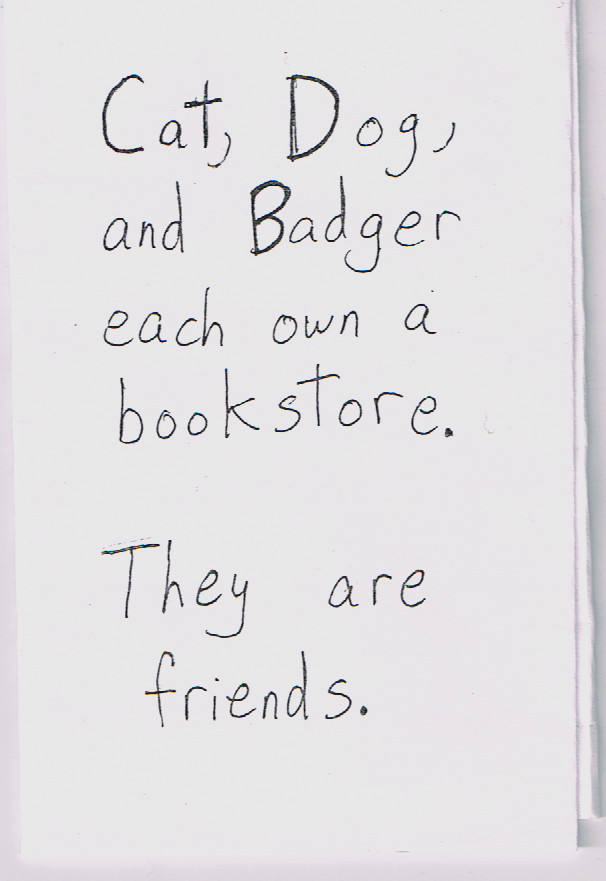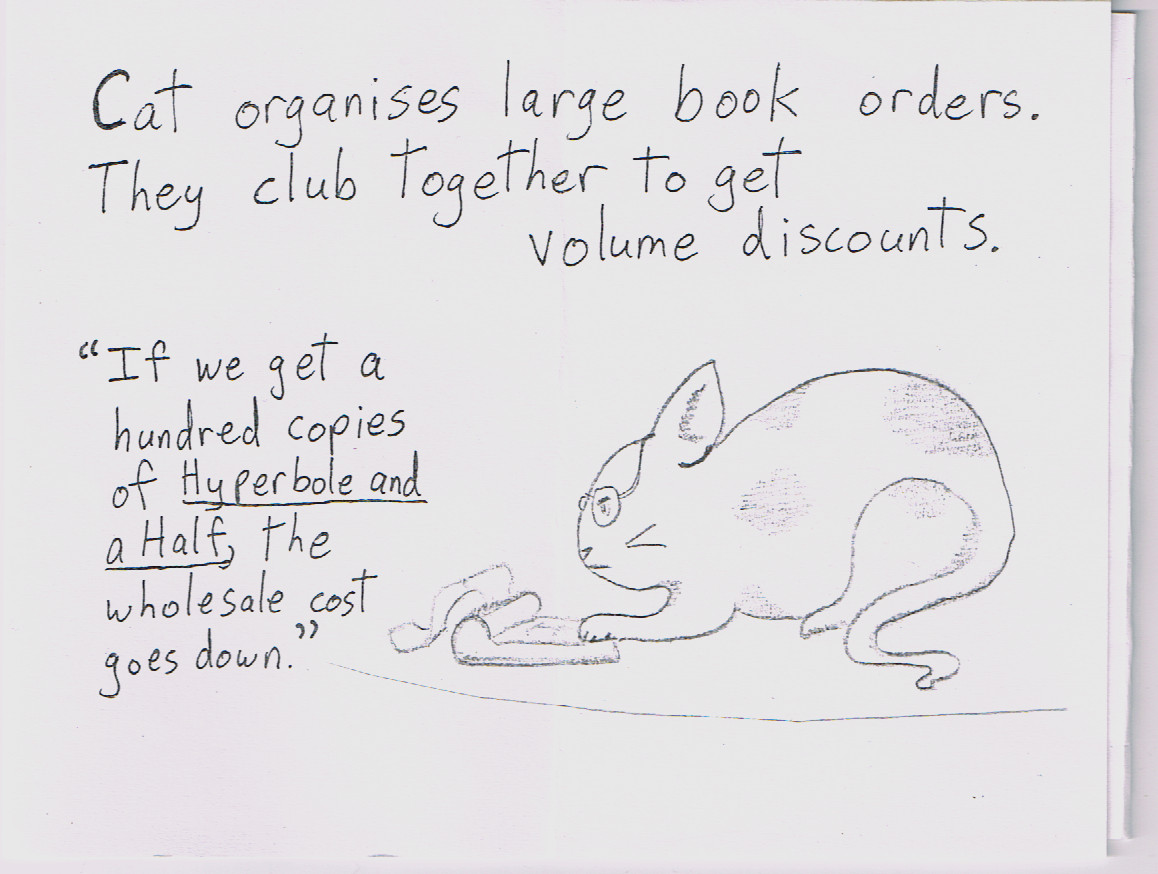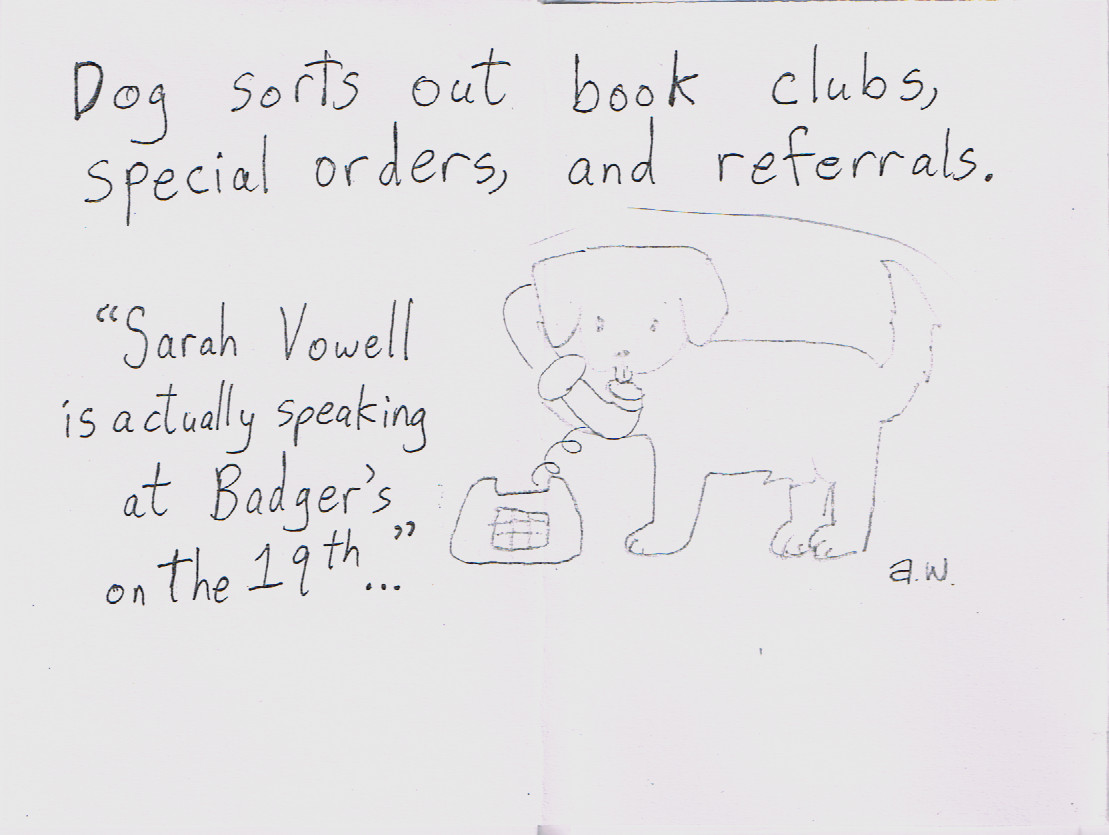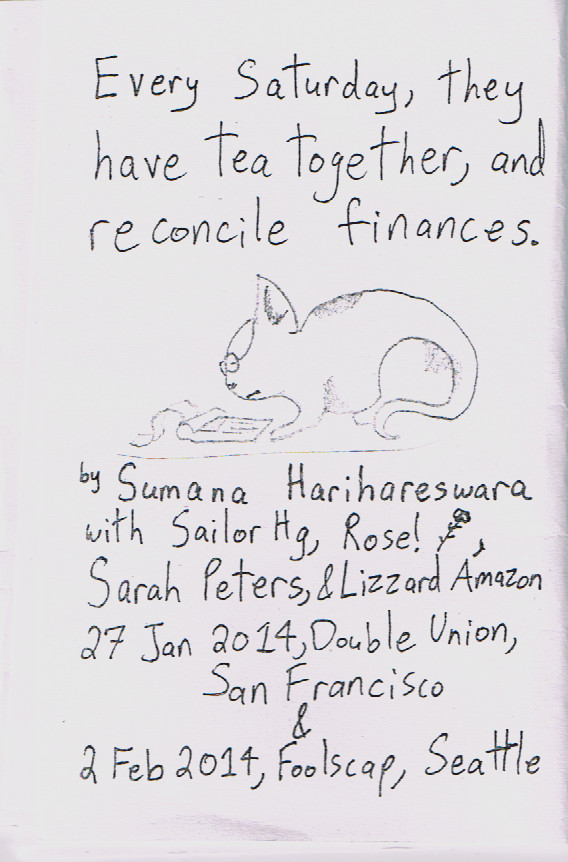I have been reading a lot of books lately and not blogging about them. This reign of non-terror must end! I am trying to note what I've read over the past, like, five or six months, so I will be super inconsistent in detail, and I bet I'm missing stuff.
Justine Larbalestier's Liar. Interesting! I believe Naamen at Borderlands noted, when I bought this, that it had a relatively non-annoying unreliable narrator. That seems very likely, but I still itch at unreliable narrators. At least this text foregrounds a woman's experience!
Ellen Ullman's By Blood. The narrator is not unreliable, but he does have bad ... whatever the emotional equivalent of metacognition is. As always with Ullman, you get closely observed characters going through uncomfortable changes in life and identity, and mildly Dick/Kafka-y paranoia (more Dick-esque because it's in California). There is also a super dramatic monologue about Europe and the Jewish experience that I read aloud to Leonard.
Maureen McHugh's China Mountain Zhang. AMAZING. Read it read it read it. I should have listened to Brendan years ago. The ending makes me tear up when I think about it, but in a good, inspiring way. McHugh takes a kind-of dystopia and shows you regular people living their lives, taking courses, changing jobs, dating, moving, feeling cold, talking to friends. Including some on Mars. It's inspiring the way Quinn Norton talks about Hitchhiker's Guide being inspiring, in her essay in She's Such a Geek; the book starts with the end of the world but after that people are still living and doing stuff. (And there's fanfic.) Did you know Patrick Nielsen Hayden of Tor found this in the slush pile (of unsolicited novel manuscripts)? I'm sorry, I am incoherent about this book, read it. It is what science fiction can be.
Octavia Butler's Bloodchild & Other Stories. The title story sticks in my mind, as does "Speech Sounds". Worth reading, but pretty short. Reminds me that I want to go read the novels of hers I haven't read yet.
Jacob Shapiro's The Terrorist's Dilemma (previously). I was telling people anecdotes from this for months. The poor copyediting bothered me, but I loved the schadenfreude, the thought-provoking insights, and the bibliography. I do think there are some management tips in there as well.
Lauren Beukes's Zoo City. If you liked Moxyland but wanted a touch more fantasy, you'll like this. I like detective stories and I like seeing social milieus I don't ordinarily see, and I think Beukes does well on both.
Ann Leckie's Ancillary Justice. As I said, it blew my head off, in a great way. Ancillary Justice's viewpoint character used to be a starship and hasn't quite gotten used to being a woman. (Have any of us?) I think this book integrated fist-punching-related adventure with flashbacks and thinky conversations and interstellar intrigue and music really well. You can read the first chapter now. Ancillary Justice stands alone as a book, but I am looking forward to the next book almost as much as I am looking forward to Vikram Seth's A Suitable Girl.
Thomas Disch's Camp Concentration. Kind of like By Blood in that our narrator, though super erudite, has a snobbish outlook that makes my skin crawl a bit. At least Camp Concentration's poet/conscientious objector/diarist has a witty side. A hasty web search reveals that no one has yet compiled a list of the super-obscure words Disch uses on every page, e.g., hypogeal, daedal, epalpibrate. You could probably put something together with word frequency stats and an ebook, if you felt like it! Also Camp Concentration has a multipage syphilitic rant that I skimmed; hallucinations tend to lose me. (At least it wasn't as boring as that giant radio speech in the middle of Atlas Shrugged!) Still, I'm glad I've now read one Disch. It's memorable, and more accessible than I feared.
Jo Walton's My Real Children, as an Advance Reader's Copy (it comes out in May). I gobbled this up like nobody's business; it's compulsively readable, and inspiring. Walton pays attention to the concrete domestic details of real people's lives (as in Lifelode), she demonstrates the different ways we show our love through work (love made visible), and she foregrounds women's experiences -- especially around some aspects I don't see described enough. Read the first chapter online. Pick it up when it comes out.
Adam Hochschild's Bury the Chains. I reread most of this as comfort reading. Great footnotes and anecdotes, as always.
John Scalzi's Redshirts. I resisted for ages; it just felt like Scalzi was pandering to me, an intelligent Star Trek fan inclined to meta. Then the Hugo. Then one or two people I knew saying they liked it. Finally yesterday came the news of the TV series. So I bought it today and read it. Verdict: it is exactly as popcorn, as once-in-a-while tearjerky, as fast-paced, as clearly written, as everyone-sounds-alike, and as controlled as you thought it was going to be. It's like Agent to the Stars, down to the well-timed Mexican-food-induced toilet break. If you want an interesting take on Redshirts's subject matter, with more interiority and a less well-trodden adventure story, check out Expendable by James Alan Gardner (whose main character, by the way, is a woman of color).
E.B. White's Trumpet of the Swan. I reread this for comfort while ill, I think. It stands up. I love all of White's little touches, like the guy who gets so agitated at a little kid's irresponsible BB-gun firing that he goes home and writes a letter to the editor supporting gun control. Also, have you noticed how Trumpet and Charlotte's Web both implicitly praise kids who can keep still and watch animals quietly, and show you brief sketches of less admirable boys yucking it up?
Yael Kohen's We Killed: The Rise of Women in American Comedy. I think I haven't quite finished this yet. Whenever you're doing oral history of an entire industry you'll run into sad gaps where specific people won't speak on the record. We Killed suffers from that a little. But gosh how interesting it is! Reading this reminds me of the diversity of women in US comedy the way that Grace Hopper Celebration of Women in Computing, or Hacker School, remind me of the diversity of women in programming. I like learning about our different approaches -- to the content and to our careers in general. Back in November of 2002 a now-friend saw me perform for the first time and thought I reminded him of a young Margaret Cho. Knowing what I know now, I think I'm more like Paula Poundstone or Ellen Degeneres. (If I could split myself into several Sumanas, one would travel around in a techmobile teaching random North Americans digital literacy, one would research best practices in missiology/Communism/Amway/terrorism/etc. so we could use them in FLOSS, one would go to a different tech conference every few days doing corporate comedy, one would do an entry level coding job, and and and and.)
Allie Brosh's Hyperbole and a Half. Exactly what you're used to from the site but more of it. The last few pieces, on identity, gave me pause; Brosh turns from catch-my-breath funny to Dostoyevsky-level observant and I hope she keeps it up.
Brian K. Vaughan's Saga graphic novels. Love it, just like Mary Anne.
Baratunde Thurston's How To Be Black. I read aloud great swaths of this to Leonard because Thurston's so incisive and funny. I like how Thurston uses the experiences of his acquaintances to get different perspectives on the issues he covers; if you liked the "wait, how many sons did Dasharatha have?" arguments in Sita Sings the Blues, you'll enjoy Thurston's Council. And Thurston tore several "ohhh wow" bitter laugh/groans from me, the most I can recall since reading America: The Book. Very worthwhile.
Several chapters from The Architecture of Open Source Applications (yay case studies! They helped me wrap my head around other big codebases) and from The Practice of Programming (reassuring in that we-all-have-problems way, but I'll return and reread once I know Java or C and can read the examples).
Lizz Winstead's Lizz Free or Die. I admire Lizz Winstead for making a career out of political comedy and for achieving so much. But I found Lizz Free or Die sort of disappointing; I wanted more Daily Show details, and of course you're gonna compare this book to Bossypants and it just isn't as witty and memorable.
I'm partway through Thomas Pynchon's Bleeding Edge, and gosh it's disorienting to have Pynchon's random obscure references be things I know, e.g., the "CSS IS AWESOME" mug, rather than seventies hippie stuff. I love the prose like I always do, and the zany adventures, and a complicated and sympathetic view of the (female) protagonist's sexual life. I will probably have to just start this book over at some point to load all the backstory and minor characters into my head, and then report in full here after I'm done.
Just started: Switch: How to Change Things When Change Is Hard by Chip Heath and Dan Heath. I think this is pandering to me as much as Redshirts but I don't really mind. I'm loving it the same way I loved Gawande's Better.
Tracy Kidder's Strength in What Remains. (Read an excerpt.) What kind of person lives through atrocities, has to flee his country, and then comes back to try to do good? Who helps him? It's all that, and it's by Tracy Kidder, so you know it's good. The way he works on the school-building, in the end, and the stance he takes towards community help, is making me think about how I try to make change.
Tsitsi Dangarembga's Nervous Conditions. This short, sharp book helped me see what 1960s Rhodesia (Zimbabwe) felt like to a gifted black girl, and vividly details how people interact with each other -- and how sometimes they hurt when they're just trying to help. I'm glad Bluestockings stocks it.
And speaking of bookstores: I have bought a lot more books now that I have an independent bookstore within walking distance of my flat. Astoria Bookshop sells a fine selection and does special orders cheerfully. Yay!
 Wikimedia is participating in this year's Google Summer of Code internships and Outreach Program for Women. This week we are seeing a bunch of new folks try to learn how to navigate the world of open source, and I have some advice for you. Some of this ought to go into the Google Summer of Code student manual and the Open Advice collection.
Wikimedia is participating in this year's Google Summer of Code internships and Outreach Program for Women. This week we are seeing a bunch of new folks try to learn how to navigate the world of open source, and I have some advice for you. Some of this ought to go into the Google Summer of Code student manual and the Open Advice collection.
 How we talk: We talk in different places when we want to have different kinds of conversations. Each open source community has "a mailing list, a wiki, and an IRC channel.... a platform for discussion, storage for documentation and real-time communication." (I borrowed this explanation from the hackerspaces wiki.) An IRC channel is a constant waterfall of conversation and you aren't expected to be there all the time or catch everything. A mailing list is more like a slow-moving river, and a wiki changes slower, like a marsh.
How we talk: We talk in different places when we want to have different kinds of conversations. Each open source community has "a mailing list, a wiki, and an IRC channel.... a platform for discussion, storage for documentation and real-time communication." (I borrowed this explanation from the hackerspaces wiki.) An IRC channel is a constant waterfall of conversation and you aren't expected to be there all the time or catch everything. A mailing list is more like a slow-moving river, and a wiki changes slower, like a marsh.

 The rhythm of help: When you are learning how to contribute in open source, you're going to find that people give you links to pages that answer your questions. Here's how that usually goes:
The rhythm of help: When you are learning how to contribute in open source, you're going to find that people give you links to pages that answer your questions. Here's how that usually goes:
 What's this project like?: Figuring out whether something's a good project for you is a skill and new folks don't have that skill yet. My friend Mel wrote a guide to how she checks out an open source project -- how she takes five minutes to look on their website for certain things, to see what kind of project it is. It's fine for you to look for projects where you already have friends, or where they have already set up easy tasks for beginners. We hope that in a year you'll be one of the people coming up with new ideas, organizing those easy tasks, and helping the beginners.
What's this project like?: Figuring out whether something's a good project for you is a skill and new folks don't have that skill yet. My friend Mel wrote a guide to how she checks out an open source project -- how she takes five minutes to look on their website for certain things, to see what kind of project it is. It's fine for you to look for projects where you already have friends, or where they have already set up easy tasks for beginners. We hope that in a year you'll be one of the people coming up with new ideas, organizing those easy tasks, and helping the beginners.




